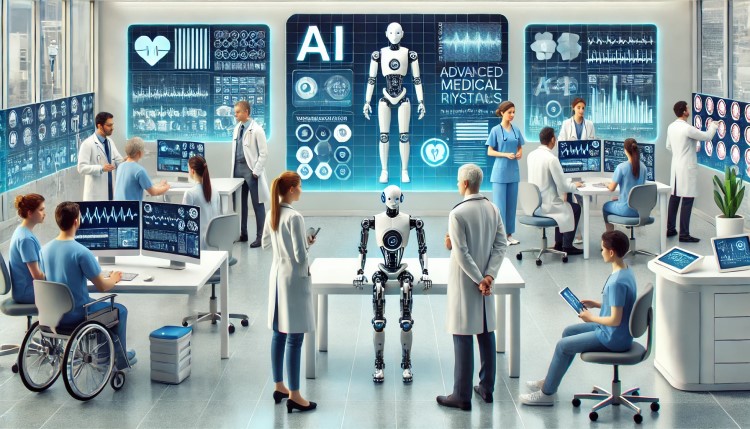The integration of artificial intelligence (AI) in healthcare is transforming the industry. It promises to revolutionize patient care, diagnostics, and operational efficiency. As technology continues to advance, the future of AI in healthcare becomes increasingly promising. Let’s explore the potential impacts and developments of AI in healthcare, highlighting the areas where it will make the most significant difference.
Revolutionizing Diagnostics
One of the most promising aspects of the future of AI in healthcare is its ability to revolutionize diagnostics. AI algorithms can analyze vast amounts of medical data with unprecedented speed and accuracy. This capability enables early detection of diseases, such as cancer, through advanced imaging techniques. For instance, AI-powered tools can examine radiological images and identify abnormalities that human eyes might miss. Consequently, this leads to earlier interventions and improved patient outcomes.
Moreover, AI’s ability to learn and adapt enhances diagnostic precision. Machine learning models can be trained on extensive datasets, constantly improving their accuracy. As a result, they can provide more accurate diagnoses over time. This iterative learning process is vital in conditions where early detection is crucial for successful treatment.
Enhancing Patient Care
The future of AI in healthcare extends beyond diagnostics to improving overall patient care. AI-driven systems can monitor patients in real-time, providing continuous health assessments. Wearable devices and smart sensors collect data on vital signs, alerting healthcare providers to any irregularities. This constant monitoring ensures that patients receive timely interventions, reducing the risk of complications.
Furthermore, AI can personalize treatment plans based on individual patient data. By analyzing genetic information, lifestyle factors, and medical history, AI systems can recommend tailored treatment options. This personalized approach enhances the effectiveness of treatments, leading to better patient outcomes and reducing the likelihood of adverse reactions.
Streamlining Administrative Tasks
In addition to clinical applications, the future of AI in healthcare includes streamlining administrative tasks. AI-powered systems can automate routine administrative functions, such as appointment scheduling and billing. This automation reduces the burden on healthcare staff, allowing them to focus more on patient care. Moreover, it minimizes errors and improves efficiency, leading to a more seamless healthcare experience for patients.
AI can also optimize resource allocation in healthcare facilities. By analyzing patient flow and resource utilization, AI systems can predict demand and allocate resources accordingly. This optimization ensures that healthcare providers are adequately staffed and equipped to handle patient needs, reducing wait times and enhancing overall service delivery.
Facilitating Drug Discovery and Development
Another critical area where the future of AI in healthcare will make a significant impact is in drug discovery and development. The traditional drug development process is time-consuming and expensive. However, AI can expedite this process by analyzing vast amounts of biological data and predicting potential drug candidates. This accelerated pace can bring new treatments to market faster, benefiting patients with innovative therapies.
AI can also identify existing drugs that could be repurposed for other conditions. By analyzing drug interactions and genetic data, AI systems can suggest alternative uses for existing medications. This repurposing can lead to cost-effective treatments and improved patient outcomes, as well-known drugs often have established safety profiles.
Overcoming Ethical and Privacy Challenges
While the future of AI in healthcare holds immense promise, it is not without challenges. One of the primary concerns is data privacy. AI systems require access to vast amounts of patient data to function effectively. Ensuring the security and confidentiality of this data is paramount. Healthcare providers must implement robust data protection measures and comply with regulations to safeguard patient information.
Ethical considerations also come into play. AI decision-making processes must be transparent and free from bias. Healthcare providers must ensure that AI systems are trained on diverse datasets to avoid perpetuating existing disparities in healthcare. Additionally, patients should have the right to understand and question AI-generated recommendations, ensuring that AI complements human judgment rather than replacing it.
Addressing Workforce Implications
The integration of AI in healthcare will inevitably impact the workforce. While AI can handle many routine tasks, it will not replace human healthcare providers. Instead, it will augment their capabilities, allowing them to focus on more complex and nuanced aspects of patient care. However, healthcare professionals will need to adapt to this new landscape.
Continuous education and training will be essential for healthcare workers to effectively utilize AI tools. Medical curricula must evolve to include AI literacy, ensuring that future healthcare providers are equipped to work alongside advanced technologies. By embracing AI, the healthcare workforce can enhance its efficiency and improve patient outcomes.
Expanding Access to Care
One of the most exciting prospects for the future of AI in healthcare is its potential to expand access to care. In many parts of the world, healthcare resources are scarce, and access to medical professionals is limited. AI can bridge this gap by providing remote diagnostics and telemedicine services. Patients in remote or underserved areas can receive expert consultations and care without the need for travel.
Telemedicine, powered by AI, can facilitate virtual appointments, enabling healthcare providers to reach a broader patient base. AI-driven chatbots and virtual assistants can provide preliminary assessments and answer common health questions, reducing the burden on healthcare facilities. This expanded access can lead to earlier interventions and improved health outcomes for populations that previously lacked adequate healthcare services.
Shaping the Future of Preventive Medicine
The future of AI in healthcare also holds promise for preventive medicine. By analyzing lifestyle data, genetic information, and environmental factors, AI systems can predict an individual’s risk for various diseases. This predictive capability allows healthcare providers to implement personalized prevention strategies. For example, AI can identify individuals at high risk for diabetes and recommend lifestyle changes to prevent the onset of the disease.
Furthermore, AI can monitor adherence to preventive measures, providing reminders and support to patients. This proactive approach can significantly reduce the incidence of chronic diseases, improving overall public health and reducing healthcare costs.
The future of AI in healthcare is a transformative force that promises to revolutionize the industry. From revolutionizing diagnostics to enhancing patient care and streamlining administrative tasks, AI’s potential is vast. However, it is crucial to address ethical and privacy concerns while ensuring that the healthcare workforce is prepared for this technological shift. By embracing AI, the healthcare industry can improve patient outcomes, expand access to care, and shape a healthier future for all. The future of AI in healthcare is not just about technology; it is about creating a more efficient, equitable, and patient-centric healthcare system.


